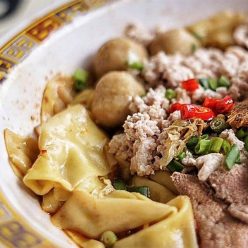Quavers quiver along the violin strings
And fingers grasp the: whale-skin threads,
Trace the image of hallowed things.
Hark the bass dum dum
Followed by the swish swish feet;
And the talking jerky with the swinging beat.
Saxon cut and Mongol shape
Dravidian red
Flows as the bandsters ape.
The Swiss wheels move to a tired midnight
The fans whirl warily in the lights,
And grin whisks us all to randy talk
While the baldish lapel the lips in some walk;
The cultured strapless shows the sights.
Let’s go to the next world
The crowds wait their share of the steaming fun
At the kuey teow stalls of the kerosene glare
And in the shadowed, rubbish lined malls,
The whisperings have just begun.
By the drains, sandalled squats
Lick their durian seeds;
Near the lanes the night-soil workers
Wipe their stinking beads;
And urchins at the car park do their good deeds.
The herbal cool-tea colours the bowls;
Mango skins attract the flies.
Oh watch the chee-kee woman cense the skies,
Crying, “This is our progressive Paradise.”
What of the world between,
Neither heaven nor hell?
King pawn move, a no-trump call
Or, a first run movie thrill
Or maybe at supper a port-wine pull?
Likeliest of all
They have set up the alarm: bell
And put the vases out on the sill
And tucked the children in for tomorrow’s school.
We are the audience
Of the three camps!
We are the campsters, too.
We rush around
To see the others,
But the mirror is a prism blue.
Thus we live in triple spheres:
In laughter, in stillness, and in tears.
Author – Wang Gungwu
Book – Pulse
Publisher – Beda Lim (Singapore)
Year published – 1950
